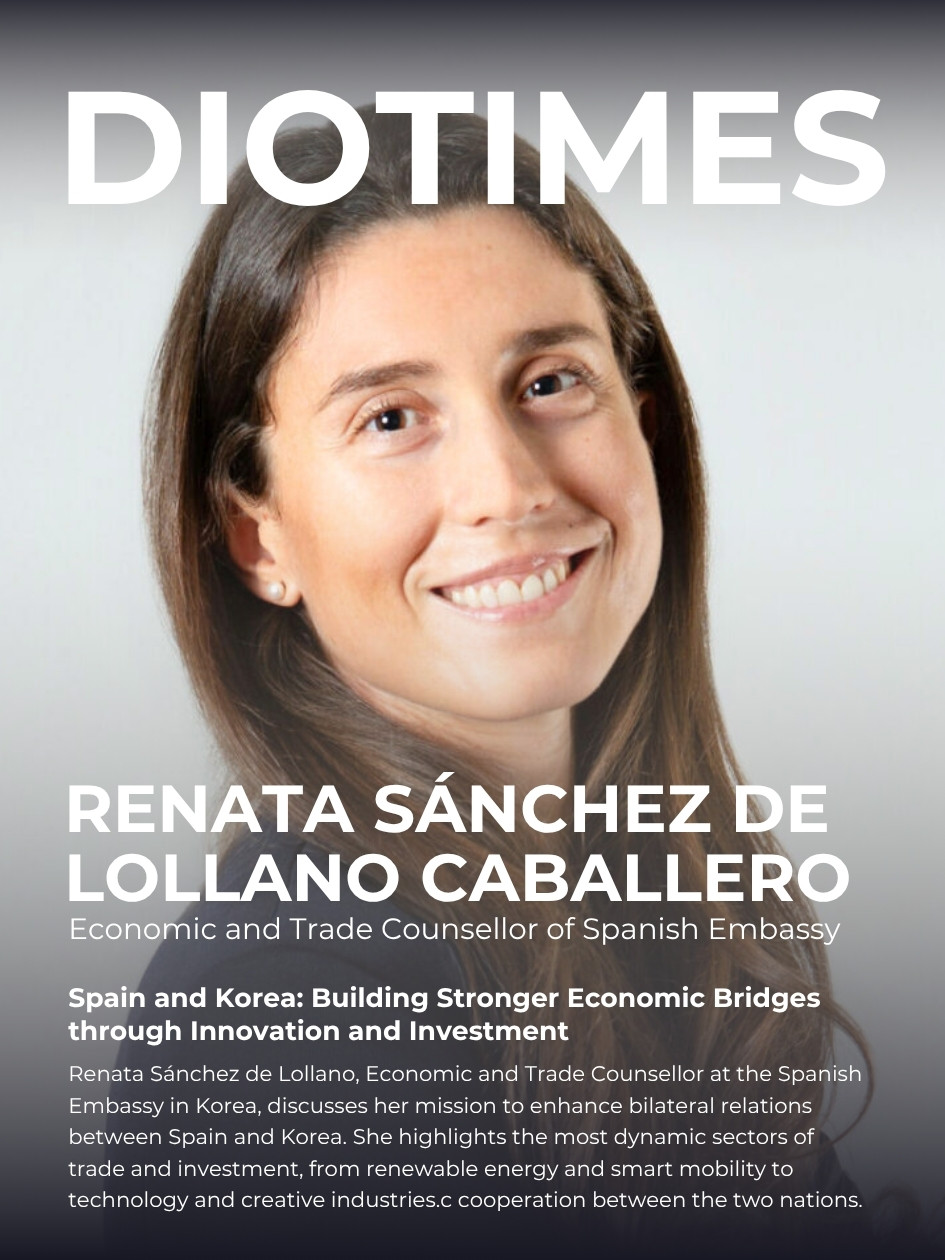Could you briefly introduce your role as the Economic and Trade Counsellor at the Spanish Embassy in Korea?
In my role as the Economic and Trade Counsellor, I focus on enhancing the economic relationship between Spain and Korea. At our office, we provide customized support to Spanish companies aiming to enter the Korean market, such as identifying business opportunities and potential partners, as well as organizing business meetings and events throughout the year to promote specific categories of Spanish products. On the investment side, we also identify productive investment opportunities for Korean companies in Spain. Another key aspect of my work involves maintaining dialogue with public-sector authorities in both Spain and Korea on economic and trade issues relevant to our bilateral relationship.
What are your main priorities in strengthening economic and trade relations between Spain and Korea?
Our main focus is to broaden access to the opportunities the Korean market offers to Spanish companies, as well as to encourage Korean investment in Spain. While significant progress has been made in both areas in recent years, there is still considerable untapped potential. Going forward, it is important to continue identifying the sectors with the greatest potential and to communicate the high added value of Spanish products. Providing guidance throughout these processes is essential: we are committed to helping companies navigate the business environment and cultural differences, while also strengthening institutional ties to support long-term cooperation.
How does your prior experience in the Spanish government and international affairs shape your current mission in Seoul?
Working in international economic affairs within the Spanish government has given me, first, a deep understanding of how international public-policy decisions are made and implemented; second, a solid perspective on the connection between public policy and business—how such decisions can directly impact companies. It has also allowed me to collaborate closely with both institutions and companies, which is highly valuable in my current role. This background enables me to navigate complex policy environments, understand the dynamics of international negotiations, and operate effectively in multicultural settings. This experience is very useful in strengthening economic ties between Spain and Korea and in supporting companies as they navigate both markets.
What are the most dynamic sectors of trade and investment between Spain and Korea today?
Korea and Spain are important trade and investment partners, maintaining a strong commercial relationship that benefits both economies. Spain’s main exports to Korea include agri-food products, pharmaceutical goods, automotive parts, and machinery and mechanical equipment. Spain’s imports from Korea include passenger vehicles, iron and steel products, plastics, and electrical equipment, among other goods. In services, Spain holds a trade surplus mainly due to tourism, as Korea is the third Asian country of origin for tourists to Spain, after China and Japan.
This trade mix reflects how complementary our economies are and sets the stage for growing cooperation. Beyond these established sectors, some of the most dynamic areas of collaboration today include technology and innovation, renewable energies, and smart mobility—fields where both countries have strong expertise.
In investment, there are also multiple avenues for collaboration. Companies from both nations are increasingly embracing forward-looking green strategies, such as electric-vehicle batteries and renewable-energy initiatives. This shared focus on sustainability and innovation is creating new opportunities for bilateral cooperation and long-term growth.
Which Spanish industries do you see as having the strongest potential for growth in Korea?
A key part of the work carried out by the Spanish Economic and Trade Office is to identify sectors with the greatest potential for Spanish companies in Korea. To support this, we publish several market-research reports each year, which are freely available on our website. These reports provide updated, practical insights for companies exploring the Korean market.
Over the past two years, for example, we have published studies on sectors such as hydrogen, cybersecurity, smart cities, olive oil, and wine. In general, the opportunities we identify span a wide range of areas—from more traditional sectors to highly innovative ones. In strategic industrial and tech sectors, the most promising opportunities often lie in very specific or niche technologies developed in Spain that may be of particular interest to Korean companies.
Conversely, in which areas can Korean companies find new opportunities in Spain?
From a broad perspective, Spain is a major European economy—open and dynamic—and is currently showing one of the highest growth rates in Europe. More specifically, Korean companies can find significant opportunities in several rapidly growing sectors. Renewable energy and green technologies are top priorities, as Spain is heavily investing in its energy transition. Korean firms can contribute their advanced technologies while also benefiting from the extensive know-how and experience that Spanish companies have in this field. Technology and digital transformation are also becoming crucial for Spain’s competitiveness, which opens the door for collaboration with Korean companies that are already leaders in these areas.
How do you evaluate the current bilateral investment climate, and what are the main challenges to overcome?
The investment climate between Spain and South Korea is increasingly dynamic, supported by complementary strengths. Spain is a reliable European partner with a solid institutional framework. Recent projects, such as Korean investments in Spanish battery plants, show strong potential. Despite the progress made, it is crucial not to become complacent, as there is still significant potential to tap in strengthening our bilateral investment ties.
Why is South Summit Korea an important platform for Spain to participate in?
Participating in South Summit Korea offers a unique opportunity to bridge Spain directly with one of Asia’s most innovative ecosystems. Korea is a global leader in technology, mobility, and energy—areas where Spanish startups and corporates are also pushing forward. It is also an opportunity to showcase Spain as a dynamic and growing market with outstanding talent and investment potential.
What specific objectives does the Spanish Embassy’s Economic and Trade Office hope to achieve at this year’s summit?
Our objectives for this year’s edition are multiple. First, we want to recognize the success of South Summit and show our support for its expansion efforts in Asia, specifically in Seoul. Second, we look forward to engaging with participating Spanish startups, learning about their internationalization plans in the Korean market, and exchanging insights on the opportunities and challenges they perceive. Third, we want to highlight the potential of the Spanish market for Korean startups interested in establishing a presence in Spain, and to share information about the “Rising Up” program offered by Invest in Spain, which provides support throughout this process. Lastly, we look forward to connecting with investors and gaining a better understanding of their views regarding potential investment opportunities in Spain’s leading-edge sectors.
Are there any Spanish startups, scale-ups, or sectors being highlighted at South Summit Korea?
Spain has a strong presence at this year’s South Summit Korea. Among the finalists, there are three Spanish startups. There was also a dedicated panel, “Born in Spain, Built for the World: Scaling Deeptech Globally,” which featured Spanish participants and an engaging exchange of ideas on the Spanish startup ecosystem.
How can Korean entrepreneurs and investors benefit from engaging with Spain at South Summit?
There are many potential benefits for Korean entrepreneurs and investors engaging with Spain at South Summit, but one key aspect is gaining awareness of the many opportunities the Spanish market offers. South Summit provides an excellent platform to highlight a startup ecosystem that is currently booming. In fact, over the past five years it has doubled in size and is now among the fastest-growing ecosystems in Europe. This vibrant startup scene is part of a broader context: as mentioned, Spain is currently one of the fastest-growing economies in the Euro area, offering a stable and dynamic environment for business. Moreover, Spain serves as a natural gateway to major global markets such as the European Union and Latin America, making it an ideal hub for international expansion.
Spain is building a strong reputation in technology, renewable energy, and creative industries. Which of these areas do you believe could be most relevant for collaboration with Korea?
All three are relevant. In renewable energy, Spain has extensive experience in wind and solar deployment, project development, and systems integration, while Korea brings strengths in batteries and hydrogen technologies. Together, these capabilities support potential cooperation in multiple areas. In technology, Korea’s leadership in semiconductors and advanced manufacturing can pair with Spain’s growing ecosystem in AI and digital services. Finally, creative industries—such as audiovisual and design—offer clear opportunities for co-productions and exchanges that create long-term, high-value ties.
How does the Spanish Embassy support innovation-driven companies that want to enter the Korean market?
Among the multiple actions carried out by the Economic and Commercial Office of the Embassy of Spain, we provide market intelligence, organize B2B meetings and trade missions, assist companies in finding local partners, and coordinate their participation in fairs and investor events. These services can be especially valuable in a distant and complex market like Korea, where local insight and trusted networks are key to doing business successfully.
Do you see opportunities for joint Spain–Korea R&D projects or university–industry partnerships?
Yes. In addition to the services provided by the Economic and Commercial Office of the Embassy of Spain, the CDTI (Spanish Institute of Technology and Innovation) has a delegation in Seoul dedicated to promoting cooperation in R&D. Relevant programs include the Korea–Spain Strategic Program (KSSP), which is currently open for proposals on AI and semiconductors; in 2026 it will focus on materials and nanomaterials. In addition, a call for proposals on infrastructure technologies is being prepared. On a multilateral level, the Eureka initiative offers the opportunity to evaluate and fund projects in any civil-use technology. Companies, research centers, and universities can participate in all these programs.
What is your long-term vision for Spain–Korea economic cooperation in the next 5–10 years?
Since the EU–Korea Free Trade Agreement came into force in 2011, significant progress has been made in strengthening trade ties. However, there is still considerable room to deepen and diversify the economic and commercial relationship between Spain and Korea. Looking ahead to the next 5–10 years, I hope to see progress in several key areas, such as improved market access for Spanish agri-food products—where procedures have so far been slow—a stronger perception of Spanish goods and services, and a greater presence of Spanish companies in the Korean market, particularly in strategically important sectors.
How do you see the role of global events like South Summit in shaping not only business deals but also cultural and educational bridges between the two countries?
Global events like South Summit play a catalytic role—not only in generating business deals and attracting talent, but also in fostering meaningful connections between people, ideas, and cultures. They create spaces where researchers, entrepreneurs, and investors from different countries can meet and exchange perspectives. These interactions help accelerate not just commercial relationships but also the people-to-people ties that form the foundation of long-term bilateral cooperation between Spain and Korea across multiple fronts—well beyond strictly economic or business dimensions.
Finally, what message would you like to share with Korean entrepreneurs, investors, and policymakers ahead of South Summit Korea 2025?
There is significant potential for collaboration between Spain and Korea in technology startups, and South Summit Korea 2025 is a unique opportunity that should not be missed. Spain’s startup ecosystem is booming, supported by an open and dynamic economy. At the Economic and Commercial Office of the Embassy of Spain, we want to actively support Korean and Spanish startups in seizing these opportunities.
Interviewee
- Economic and Trade Counsellor
- Oficina Económica y Comercial de España en Corea del Sur








